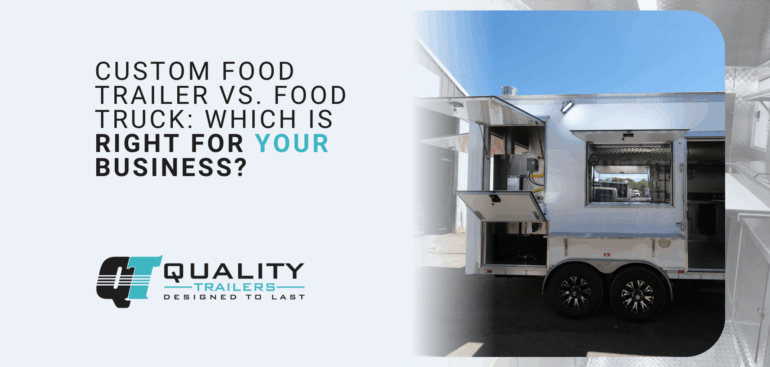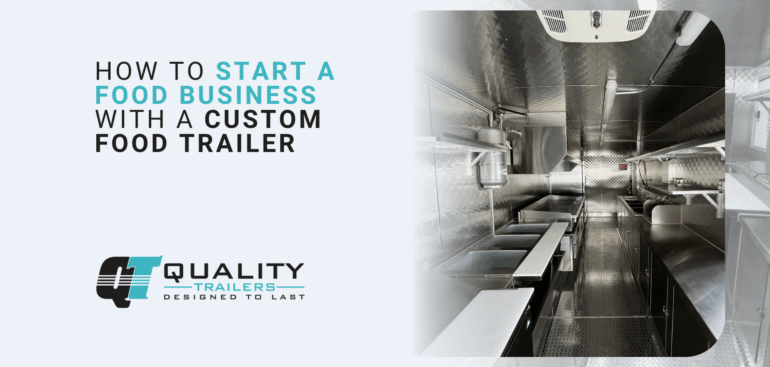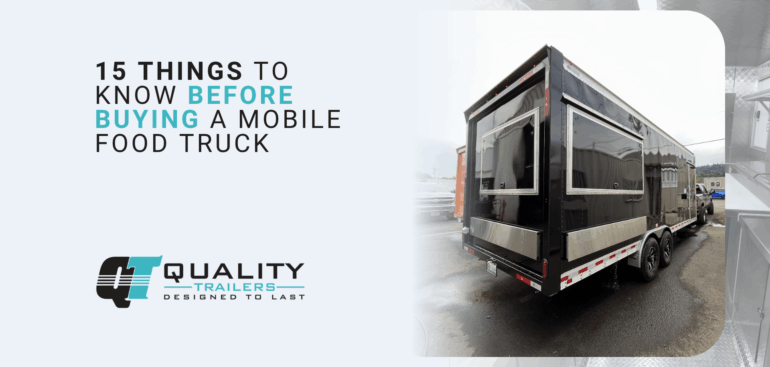Starting a mobile food business requires making smart investment decisions from day one. The choice between a custom food trailer and a food truck will shape your entire operation, from startup costs to daily maintenance requirements.
Understanding the key differences helps entrepreneurs make informed decisions that align with their budget, business goals, and operational preferences. The mobile food industry continues expanding, with successful operators focusing on strategic equipment choices that maximize profitability while minimizing operational complexity.
Initial Investment and Startup Costs
The financial gap between trailers and trucks creates different pathways to profitability. Food trailers cost approximately half the price of food trucks. This significant cost difference impacts your entire business model and growth trajectory.
This startup costs difference affects your break-even timeline significantly. Lower initial investment means faster payback periods and more working capital available for inventory, marketing, and prime location fees. Smart entrepreneurs understand that preserving capital during the startup phase provides crucial flexibility for unexpected opportunities and challenges.
Financing Considerations
Traditional lenders often view trailers as more favorable investments due to lower risk exposure. The reduced loan amounts make approval processes smoother and monthly payments more manageable for new entrepreneurs entering the mobile food business.
Equipment financing options vary significantly between trailers and trucks. Trailers qualify for equipment loans with favorable terms, while food trucks often require commercial vehicle financing with higher interest rates and stricter qualification requirements. Building profitable food businesses starts with understanding these financial fundamentals.
Hidden Cost Analysis
Beyond purchase prices, ongoing expenses create substantial differences between operating models. Food trucks require commercial vehicle insurance, which costs significantly more than trailer insurance. Registration fees, inspection requirements, and licensing vary by state but consistently favor trailers over motorized units.
Fuel costs represent another major consideration. Trucks consume fuel whether serving customers or traveling to locations, while trailers only require fuel for transportation between sites. This efficiency advantage compounds over time, especially for businesses serving multiple locations weekly.
Space Efficiency and Trailer Advantages
Food trucks appear mobile and convenient, but trailers offer superior space utilization. Trailers provide more interior space and accommodate multiple service windows. This translates to larger storage capacity, expanded menu options, and the ability to serve more customers simultaneously.
The space advantage becomes crucial during peak service hours when efficiency determines revenue potential. Professional kitchen designers consistently recommend trailers for operators planning complex menus or high-volume service requirements.
Equipment Installation Benefits
Trailers dedicate every square foot to food preparation and service, while trucks must accommodate engines, transmissions, and driver areas. This allows for:
- Larger commercial-grade equipment installation
- Enhanced storage solutions for ingredients and supplies
- Multiple prep stations for complex menu items
- Better workflow organization for staff efficiency
Design Flexibility and Customization
Custom trailer designs accommodate unique business requirements more effectively than truck conversions. Choosing the right food trailer involves understanding how design flexibility impacts long-term operations and revenue potential.
Trailer customization options include specialized ventilation systems, multiple cooking zones, expanded refrigeration capacity, and customer-facing design elements that enhance brand visibility. These modifications prove difficult or impossible in truck configurations due to structural limitations.
Operational Flexibility and Maintenance Comparison
Equipment breakdowns affect trailers and trucks differently. When your truck’s engine fails, your entire operation stops. Trailer owners can rent replacement tow vehicles for approximately $50 daily while maintaining normal service schedules.
This operational flexibility protects revenue streams and customer relationships. Mechanical issues become minor inconveniences rather than business disasters that force temporary closures. Smart operators appreciate this risk mitigation advantage when planning long-term business strategies.
Long-term Maintenance Costs
Trucks require dual maintenance systems covering both vehicle and kitchen components. Trailers separate these concerns, allowing specialized mechanics to handle towing vehicles while food service technicians focus on kitchen equipment. This specialization often results in faster repairs and lower overall maintenance expenses.
Professional maintenance scheduling becomes simpler with trailers. Kitchen equipment servicing doesn’t require coordinating with automotive repair shops, reducing downtime and simplifying vendor relationships. Quality materials and construction further reduce maintenance frequency and costs over time.
Seasonal Storage Considerations
Seasonal operators benefit significantly from trailer storage advantages. Trucks require climate-controlled storage to prevent engine and fuel system damage during extended periods of inactivity. Trailers store more easily and cost-effectively, with basic covered storage sufficient for most climates.
Winter storage costs can represent substantial expenses for seasonal operators. Trailers typically cost 60-70% less to store than trucks, making seasonal business models more profitable in regions with limited year-round operating opportunities.
Location Strategy and Parking Requirements
Parking requirements vary significantly between trailers and trucks, affecting location strategy and daily operations. Trucks need standard vehicle parking spaces but face restrictions in many urban areas due to commercial vehicle regulations.
Trailers require designated spaces with adequate room for unhitching and setup procedures. However, they often access locations where trucks cannot operate due to size or weight restrictions. This flexibility opens additional revenue opportunities in residential areas, private events, and specialized venues.
Permit and Compliance Considerations
Both options require health department permits and business licenses, but parking regulations differ by municipality. Trailers may face fewer restrictions in residential areas and special events, while trucks often encounter commercial vehicle limitations that affect prime location access.
Understanding local regulations becomes crucial for location planning. Professional permitting guidance helps entrepreneurs navigate complex regulatory requirements and avoid costly compliance issues that could impact business operations.
Event and Catering Opportunities
Private event catering represents a lucrative market segment that favors trailer operations. Wedding venues, corporate events, and private parties often prefer trailers due to reduced noise levels, elimination of exhaust fumes, and improved aesthetic integration with event settings.
Catering contracts typically command premium pricing, making this market segment particularly attractive for operators seeking higher profit margins. Trailers access more venues and create better customer experiences in these premium market segments.
Revenue Potential Analysis
The mobile food industry generates 6.2% profit margins compared to traditional restaurants at 1-3%. However, your truck vs trailer cost decision influences how quickly you reach profitability and scale operations.
Lower initial investments allow trailer owners to reinvest profits into business growth, additional locations, or menu expansion faster than truck operators managing higher debt service requirements. This capital efficiency advantage compounds over time, enabling faster scaling and market expansion opportunities.
Market Positioning Strategies
Successful mobile food businesses understand positioning advantages that trailers provide. Premium menu pricing becomes more sustainable when operating costs remain controlled through efficient equipment choices. Effective marketing strategies help operators communicate value propositions that justify premium pricing structures.
Brand development opportunities expand with trailer operations due to increased customization flexibility and reduced operational constraints. Professional branding becomes more cost-effective when applied to trailers versus trucks, improving return on marketing investments.
Technology Integration and Modern Features
Modern food trailers accommodate advanced technology integration more effectively than truck conversions. Point-of-sale systems, inventory management software, and customer engagement platforms install more easily in trailer configurations with dedicated electrical systems and expanded interior space.
Solar power integration represents an emerging trend that benefits trailer operations significantly. Innovation in trailer design includes sustainable energy solutions that reduce operating costs while appealing to environmentally conscious consumers.
Future-Proofing Your Investment
Technology advancement cycles favor trailer operations due to easier upgrade pathways and reduced integration complexity. Equipment modifications and technology installations prove simpler and more cost-effective in trailer configurations compared to truck conversions with space and electrical limitations.
Smart operators consider long-term technology trends when making initial equipment decisions. Trailers provide better adaptation capabilities for emerging technologies like automated ordering systems, advanced food safety monitoring, and enhanced customer engagement platforms.
Staff Training and Operational Efficiency
Employee training requirements differ significantly between trailer and truck operations. Truck operations require staff members capable of driving commercial vehicles, limiting hiring pools and increasing training costs. Trailer operations separate driving responsibilities from food service duties, expanding available talent pools.
Workflow efficiency improves in trailer configurations due to optimized kitchen layouts and expanded workspace availability. Staff productivity increases translate directly to improved customer service and higher revenue per labor hour, enhancing overall profitability.
Safety and Insurance Considerations
Workplace safety statistics favor trailer operations due to reduced accident risks associated with commercial vehicle operation. Insurance premiums reflect these risk differences, with trailer operations typically qualifying for lower rates across multiple coverage categories.
Food safety compliance becomes easier to maintain in trailer configurations with dedicated systems and expanded storage capacity. Health department inspections proceed more smoothly when operations aren’t constrained by vehicle integration compromises.
Starting Your Mobile Food Business
Successful mobile food entrepreneurs understand that equipment decisions impact every aspect of business operations. Starting a mobile food business requires careful planning and strategic decision-making that considers both immediate needs and long-term growth objectives.
Market research consistently shows that operators who choose trailers over trucks achieve profitability faster and maintain higher profit margins over time. These advantages compound through reduced operating costs, increased operational flexibility, and enhanced scalability opportunities.
Planning Your Business Model
Business model development should consider equipment capabilities and limitations from the outset. Custom food trailer business planning involves understanding how equipment choices impact menu development, location strategy, and growth potential.
Successful operators align equipment capabilities with target market requirements and revenue goals. This strategic alignment prevents costly equipment changes and ensures optimal return on initial investments throughout the business lifecycle.
Why Choose Quality Trailers Inc for Your Custom Food Trailer Project
Quality Trailers Inc brings over 23 years of manufacturing expertise to every custom food trailer project. Since transitioning from construction trailers to food trailers in 2010, this family-owned Oregon business has consistently delivered high-quality mobile kitchens that exceed client expectations.
Every food trailer rolling off their production floor is permitted and built to code, with CAD design expertise ensuring compliance at every stage. Their innovative approach includes solar panel food trailer options launched in 2016, demonstrating commitment to sustainable business solutions that reduce operating costs while appealing to environmentally conscious consumers.
Quality Trailers Inc focuses on durability, craftsmanship, and operational efficiency. Their comprehensive approach includes complete plan sets for health department pre-approval, ensuring your investment meets all regulatory requirements from day one. Professional consultation and design services help entrepreneurs make informed decisions that align with their specific business goals and operational requirements.
Frequently Asked Questions
What are the main cost differences between food trailers and trucks?
Food trailers cost significantly less than fully equipped food trucks. This significant difference affects financing options, monthly payments, and time to profitability. Additional ongoing costs favor trailers, including lower insurance premiums, reduced fuel consumption, and simplified maintenance requirements.
How do parking requirements differ between trailers and trucks?
Food trucks need standard parking spaces but face commercial vehicle restrictions in many areas. Trailers require space for unhitching but often access locations where trucks cannot operate due to size limitations. Many venues prefer trailers for private events due to reduced noise and exhaust concerns.
Which option offers better long-term maintenance costs?
Trailers generally provide lower maintenance costs because mechanical issues with tow vehicles don’t shut down kitchen operations. Truck breakdowns stop the entire business until repairs are completed. Trailers also benefit from specialized maintenance services that focus exclusively on food service equipment rather than dual automotive and kitchen systems.
Can food trailers generate the same revenue as food trucks?
Yes, trailers often generate higher revenue due to increased interior space, multiple service windows, and lower operating costs. The space efficiency allows for larger menus and faster customer service. Premium event catering opportunities frequently favor trailers, commanding higher profit margins than typical food truck operations.
What permits and licenses do I need for each option?
Both require health department permits, business licenses, and food handler certifications. However, parking and location permits may vary, with trailers sometimes facing fewer commercial vehicle restrictions than trucks. Professional permit assistance ensures compliance with all local, state, and federal requirements for mobile food operations.
How long does it take to start earning profit with each option?
Trailers typically reach profitability faster due to lower initial investments and reduced operating costs. While exact timelines vary by location and business model, trailer operators often achieve positive cash flow 3-6 months sooner than truck operators managing higher debt service and operating expenses. This advantage compounds over time through increased reinvestment opportunities.




